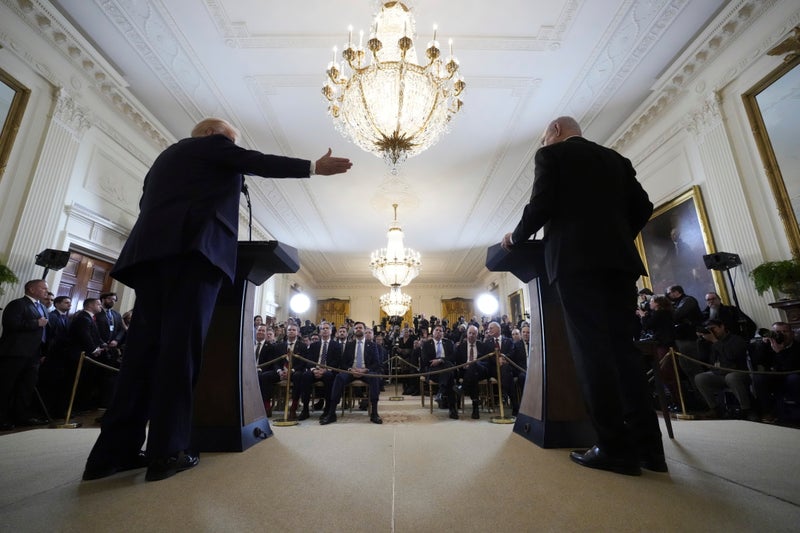Can Trump actually carry out his bombshell plan to seize Gaza Strip?
Can Trump actually carry out his bombshell plan to seize Gaza Strip?
Share:
Trump said the U.S. could take ‘long-term ownership’ of Gaza but there are many obstacles he would have to overcome to make it a reality. President Donald Trump’s bombshell plan to seize control of the Gaza Strip has sparked worldwide condemnation. At a White House press conference with Israeli Prime Minister Benjamin Netanyahu on Tuesday evening, Trump said that Palestinians could be resettled away from their homes in the war-torn enclave and said he wouldn’t rule out potentially deploying American troops. His plan to transform Gaza “from a hell hole” to the “Riviera of the Middle East” has even divided his MAGA faithful.
![[Critics pointed out several hurdles with Trump’s hopes in Gaza - including whether he would need Congressional approval]](https://static.independent.co.uk/2025/02/05/09/APTOPIX_Israel_Palestinians_Gaza_81647.jpg)
But, now questions swirl on if he can actually follow through with his plans and whether he can “take over” the disputed land in the Middle East on his own. However, Clark added it would be a “very, very difficult proposition” to pull off. Here is a look at some of the hurdles Trump faces in his ambitions:. Longtime Trump support, South Carolina Senator Lindsey Graham didn’t appear to be onboard with the plan. “I think most South Carolinians would probably not be excited about sending Americans to take over Gaza. I think that might be problematic, but I’ll keep an open mind,” he said.
![[One of the biggest challenges is that the rules of the Geneva Convention prevent an occupying power from removing people - such as Trump has suggested be done with Gaza after war has left a humanitarian crisis in the region]](https://static.independent.co.uk/2025/02/03/05/Israel_Palestinians_47198.jpg)
Democratic representative Rashida Tlaib of Michigan, meanwhile, decried Trump’s plan as “fanatical bull****.”. “Palestinians aren’t going anywhere,” Tlaib said in a post on X. Former Israeli prime minister Ehud Olmert also told the broadcaster that “every party involved except for Israel is completely against it.”. "On the day that I will see American soldiers coming in great numbers to Gaza, I will then make up my mind how serious it is," Olmert said.
Congress has not declared war on any nation since the World War II. It has, however, approved over 100 “military operations” through the use of resolutions that authorized military force, the Iraq war being one example. Given the lack of detail in Trump’s plan for Gaza and with Republicans already divided, it is unlikely, but not impossible, that Congress would support it - or if he would even need their approval to send troops in.
Setting aside the morality and legality of Trump’s plans for a moment, logistically his vague proposal does not look like “a viable alternative” right now, according to Clark, who reeled off a long list of vital questions that need answering. The first enormous hurdle is getting Israel and Palestinian people to agree and also deciphering who would represent the Palestinian people. “Does Hamas? Are they going to agree? What about the Palestinian Authority?” Clark said.
The second major question is where would the Palestinian people even go if they left Gaza?. “The Jordanians have said they don't want them. Egyptians said they don't want them,” Clark said. “They've got their own issues with population. That's one and a half, almost 2 million people that have got to go somewhere. Are they going to be in a refugee camp? Who's going to build it? Where is it going to be?”.
There would also be questions over the rules of engagement for the U.S. military and whether soldiers are acting as peacekeepers, or do they “take the role of the Israelis,” which would not go down well, Clark added. The retired general said that if American troops are deployed, the U.S. would be caught up “in the middle of a conflict in the Middle East that's probably not sustainable.”. In terms of the number of troops required for the initial phase, Clark speculated it would be in the thousands and the resources of the U.S. military would need to be considered.
“At this point, we have about 440,000 in the Army. We're stretched from the Pacific into Europe. And now we're going to put we have a couple of thousand, maybe, in the Middle East? Now we're going to put what in Gaza to make sure this works — 20,000, 40,000? And then rotate them so you have to have three times the number that are deployed?” Clark asked. For Trump’s vision to become a reality, legally he would require the consent of Palestine and the Palestinian people to take control of Gaza. One of the biggest obligations of an occupying power comes under Article 49 of the Geneva Conventions.
That rule prohibits an occupying power from forcibly transferring or removing people from a territory. All other states also have an obligation not to assist an occupying power in violating international humanitarian law. So that means if the U.S. wanted to move the population of Gaza by force, Israel could not assist in this action. Likewise, the U.S. cannot assist Israel in violating the rules. Occupying powers are allowed to remove a population for the reason of safety.
Trump and his Middle East envoy who visited Gaza last week have repeatedly referenced how dangerous it is. Trump questioned how people could “want to stay” there, saying they have “no alternative” but to leave. However, removing people for this reason has to only be temporary. Once it’s fine for someone to return, they must be returned. Transferring a population has to be consensual. But in this specific case, it would mean the consent of all Palestinians in Gaza. The U.S. could not force anyone to move who does not want to.


.jpg?auto=webp&width=800)

















